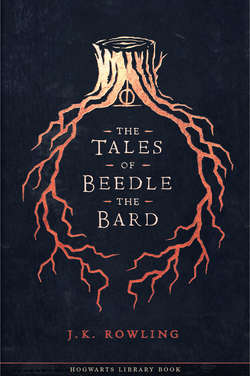Читать книгу The Tales of Beedle the Bard - Дж. К. Роулинг - Страница 1
Introduction
ОглавлениеThe Tales of Beedle the Bard is a collection of stories written for young wizards and witches. They have been popular bedtime reading for centuries, with the result that the Hopping Pot and the Fountain of Fair Fortune are as familiar to many of the students at Hogwarts as Cinderella and Sleeping Beauty are to Muggle (non-magical) children.
Beedle’s stories resemble our fairy tales in many respects; for instance, virtue is usually rewarded and wickedness punished. However, there is one very obvious difference. In Muggle fairy tales, magic tends to lie at the root of the hero or heroine’s troubles – the wicked witch has poisoned the apple, or put the princess into a hundred years’ sleep, or turned the prince into a hideous beast. In The Tales of Beedle the Bard, on the other hand, we meet heroes and heroines who can perform magic themselves, and yet find it just as hard to solve their problems as we do. Beedle’s stories have helped generations of wizarding parents to explain this painful fact of life to their young children: that magic causes as much trouble as it cures.
Another notable difference between these fables and their Muggle counterparts is that Beedle’s witches are much more active in seeking their fortunes than our fairy-tale heroines. Asha, Altheda, Amata and Babbitty Rabbitty are all witches who take their fate into their own hands, rather than taking a prolonged nap or waiting for someone to return a lost shoe. The exception to this rule – the unnamed maiden of ‘The Warlock’s Hairy Heart’ – acts more like our idea of a storybook princess, but there is no ‘happily ever after’ at the end of her tale.
Beedle the Bard lived in the fifteenth century and much of his life remains shrouded in mystery. We know that he was born in Yorkshire, and the only surviving woodcut shows that he had an exceptionally luxuriant beard. If his stories accurately reflect his opinions, he rather liked Muggles, whom he regarded as ignorant rather than malevolent; he mistrusted Dark Magic, and he believed that the worst excesses of wizardkind sprang from the all-too-human traits of cruelty, apathy or arrogant misapplication of their own talents. The heroes and heroines who triumph in his stories are not those with the most powerful magic, but rather those who demonstrate the most kindness, common sense and ingenuity.
One modern-day wizard who held very similar views was, of course, Professor Albus Percival Wulfric Brian Dumbledore, Order of Merlin (First Class), Headmaster of Hogwarts School of Witchcraft and Wizardry, Supreme Mugwump of the International Confederation of Wizards, and Chief Warlock of the Wizengamot. This similarity of outlook notwithstanding, it was a surprise to discover a set of notes on The Tales of Beedle the Bard among the many papers that Dumbledore left in his will to the Hogwarts Archives. Whether this commentary was written for his own satisfaction, or for future publication, we shall never know; however, we have been graciously granted permission by Professor Minerva McGonagall, now Headmistress of Hogwarts, to print Professor Dumbledore’s notes here, alongside a brand new translation of the tales by Hermione Granger. We hope that Professor Dumbledore’s insights, which include observations on wizarding history, personal reminiscences and enlightening information on key elements of each story, will help a new generation of both wizarding and Muggle readers appreciate The Tales of Beedle the Bard. It is the belief of all who knew him personally that Professor Dumbledore would have been delighted to lend his support to this project, given that all royalties are to be donated to Lumos, a charity which works to benefit children in desperate need of a voice.
It seems only right to make one small, additional comment on Professor Dumbledore’s notes. As far as we can tell, the notes were completed around eighteen months before the tragic events that took place at the top of Hogwarts’ Astronomy Tower. Those familiar with the history of the most recent wizarding war (everyone who has read all seven volumes on the life of Harry Potter, for instance) will be aware that Professor Dumbledore reveals a little less than he knows – or suspects – about the final story in this book. The reason for any omission lies, perhaps, in what Dumbledore said about truth, many years ago, to his favourite and most famous pupil:
‘It is a beautiful and terrible thing, and should therefore be treated with great caution.’
Whether we agree with him or not, we can perhaps excuse Professor Dumbledore for wishing to protect future readers from the temptations to which he himself had fallen prey, and for which he paid so terrible a price.
J K Rowling
2008
